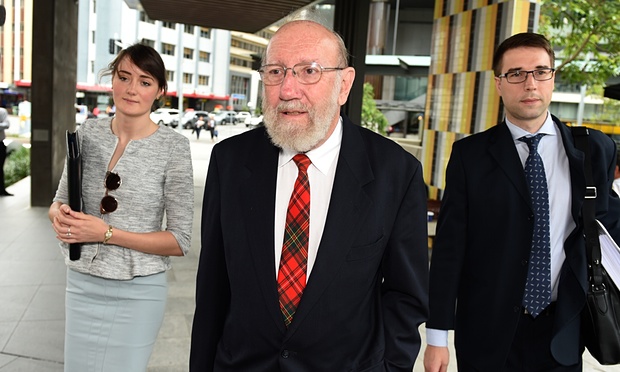Counsellor Discussing Student Penis Size Did Not Alarm Principal, Inquiry Hears
By Joshua Robertson
The headmaster of a Brisbane school did not think it “alarming” or “improper” when two students complained a school counsellor had discussed their penis sizes with the other, a commission has heard. Former St Paul’s principal Gilbert Case gave evidence at the hearings of the royal commission into institutional responses to child sex abuse on Friday, concerning his former school. The commission has heard evidence former counsellor Kevin Lynch abused boys at St Paul’s and earlier at Brisbane Grammar school over two decades before his death in 1997. Lynch killed himself after a student wore a wire to a meeting with him where he confessed his sexual abuse. Case told the commission he had arranged to call Lynch during the meeting to check on his welfare after he confided he “could be harmed” during it. Case said he did not know he was meeting a former St Paul’s student nor did he suspect his friend Lynch was what he now knew to be a “wholesale paedophile”. Case was later employed as executive director of schools in the Brisbane Anglican diocese with the personal encouragement of then-archbishop and later Australian governor general Peter Hollingworth. He was eventually forced to step down over his handling of allegations about Lynch and another paedophile he employed, Gregory Robert Knight. Case was also forced to deny an accusation that he tailored evidence to the royal commission to disguise his knowledge of concerning behavior by Lynch. He told the commission hearing in Brisbane that he did not consider as “alarming” or “improper” the behavior of Lynch, whom two students complained in 1995 had discussed the topic of each’s penis size with the other. Case provoked the derision of the public gallery and the seeming incredulity of the counsel assisting the commission David Lloyd, who asked him if he was suggesting that community standards had changed to the extent that what would now be considered alarming would not have been in 1995. Case claimed for the first time before the commission that he did “not think it was all right” for Lynch to be discussing this with students “and I told him so”. Case said he did not at the time “regard it as improper behaviour”. . Lloyd responded: “Is that seriously your evidence, that you didn’t regard that as improper behaviour by a school counsellor?” Case replied: “I think it must be.” He said he regarded the incident as “a slip-up or a silliness rather than a major or continuing problem”. He then said he told Lynch privately words to the effect that, “if you’ve been doing that sort of thing, you’re being silly and you need to get yourself into line”. Lloyd then accused Case of instructing lawyers for the insurers of the Anglican diocese of Brisbane, who would be responsible for settling student damages claims against the school, to use wording in a statement to the commission that omitted the fact he had received complaints from the students in 1995 about Lynch’s conduct. Case, in a letter to law firm Minter Ellison, said in regard to the incident: “The form of words to be preferred is probably something like this: ‘They expressed to me concerns that problems they confided to Lynch about problems with their families and personal development had been betrayed to the other’.” Lloyd accused Case of instructing the legal firm to leave out “express references” to the penis size incident as he knew it was evidence “of the utmost importance and reflected very badly on you”. Case denied this and also that his handling of complaints about Lynch were influenced by his friendship with the counsellor. He told the commission on Thursday that he did not think at the time that a teacher revealing his penis to students or fondling their penises amounted to criminal conduct. The commission has witness accounts that Case ignored complaints about both Lynch and Knight. Case rejects these, along with another account from a former St Paul’s teacher, that Case told staff Hollingworth had “washed his hands” of the controversy around Lynch after it became public. As executive director of Anglican schools in Brisbane, Case’s duties included chairing a meeting about the response of schools to complaints about child sexual abuse. Case said he could not recall being asked at any time when applying for the job about handling of sexual abuse. When pressed by Lloyd, Case said he regretted not acting on warning signs which he said he recognised only in hindsight. This included Lynch’s use of a green and red lighting system to restrict access to his office, the counsellor’s failure to follow advice to keep his door ajar and his practice of accepting visits from students at home. The commission has heard extensive evidence of Lynch’s practice of sexually abusing students, including through hypnosis and under the guise of “relaxation therapy” in his offices at St Paul’s and Brisbane Grammar over two decades until he took his own life in 1997. Case also earlier employed paedophile music teacher Gregory Robert Knight despite warnings about his inappropriate behaviour towards boys at Brisbane Boys College. When Knight was dismissed after complaints of more inappropriate behaviour, Case gave him a reference that allowed him to gain employment in the Northern Territory, where he was convicted of sexually abusing a student. He was later convicted of sexually abusing St Paul’s students.
|
.
Any original material on these pages is copyright © BishopAccountability.org 2004. Reproduce freely with attribution.
